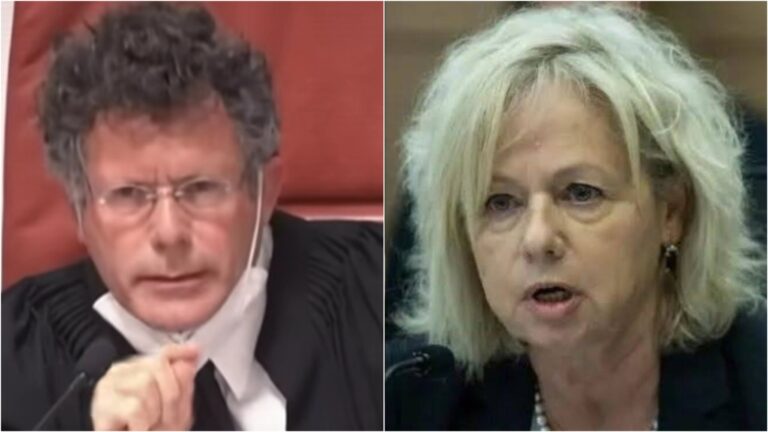By Rabbi Yair Hoffman
As many people have seen or heard, former prime minister Naftali Bennett filed a NIS 1 million (over $292,000) defamation lawsuit this week against Rabbi Ronen Shaulov. Rabbi Shaulov is a baal teshuvah who has succeeded in inspiring thousands toward a religious life. The lawsuit was because the Rabbi had falsely claimed that Bennett’s parents, Myrna and Jim, were Reform Jewish converts and, therefore, not halachically Jewish.
How do we know that the Rabbi’s claims are wrong? We have six reasons. Based upon a thorough examination of government documents, we know the following:
- Naftali Bennet’s mother is named Myrna Bennet. Her maiden name was Lefko. This is short for Lefkowitz. Most Lefko’s and Lefkowitz’s are Jewish.
- Myrna’s mother was Mildred nee Szewc. She was born on February 16, 1903 in Wsielub, Grodno in Belarus. Szewc is a Jewish name and Grodno was a very Jewish area. She passed away in Haifa in August of 1989.
- Mildred’s mother was Minya-Lenka Leah Chertok. Leah and Chertok are Jewish names. She was born in 1868. She passed away in 1917 in Novardik. Mildred was the fourth of seven children. Her eldest brother was Max Shaff(1890–1953), followed by her sister Elke Szewc(1892–1941), and another sister, Rosa Szewc(1899–1942), a sister Fanny (1906), a brother Michael (1907-1933) who passed away in Havana Cuba, and another brother Sydney Shaff (1911-1977). All of the siblings were born in Wsielub, Grodno. Two sisters, Elke and Rosa were murdered in the holocaust. All of these names are very Jewish.
- Mildred’s father was Leiser Eliezer Borishanski-Szewc. He was born in 1868 and passed away in Warsaw, Mazowieckie, Poland in 1920. Lazer and Eliezer and Borishansky are all Jewish names.
- Mildren was living in Brooklyn in the year 1935.
- She married Irvin (Israel) Lefko Lewkosicz (1905-1990), on January 29, 1936 in Brooklyn, New York. These are all very Jewish names.
Why not subscribe to this author’s weekly parsha sheet on Emes – Truth? Just send an email with the word “subscribe” in it to [email protected]
While a Rav on Long Island in the 1990’s and 2000’s, I was relied upon by the Eidah HaChareidis, the Rabbanut, and Rav Belsky zt”l to accurately research matters of yuchsin. Regarding the lawsuit, there are two halachic issues here. The first is that it is very wrong to call someone a different status than they are. The second issue is that it is forbidden to sue another Jew in secular court. Doing so is violation of a prohibition called going to “Arkaos.”
THE FALSE DEFAMATION PROHIBITION
The offending Rabbi should apologize to Bennett and perhaps review the pertinent section of the Talmud in Bava Metziah 58b:
Rabbi Yoḥanan says in the name of Rabbi Shimon ben Yoḥai: Greater is the transgression of verbal mistreatment than the transgression of monetary exploitation, as with regard to this, verbal mistreatment, it is stated: “And you shall fear Hashem.” But with regard to that, monetary exploitation, it is not stated: “And you shall fear Hashem.” And Rabbi Elazar said this explanation: This, verbal mistreatment, affects one’s body; but that, monetary exploitation, affects one’s money. Rabbi Shmuel bar Naḥmani says: This, monetary exploitation, is given to restitution; but that, verbal mistreatment, is not given to restitution.
The Gemara relates further: Anyone who humiliates another in public, it is as though he were spilling blood. Rav Naḥman bar Yitzḥak said to him: You have spoken well, as we see that after the humiliated person blushes, the red leaves his face and pallor comes in its place, which is tantamount to spilling his blood. Abaye said to Rav Dimi: In the West, i.e., Eretz Yisrael, with regard to what mitzva are they particularly vigilant? Rav Dimi said to him: They are vigilant in refraining from humiliating others, as Rabbi Ḥanina says: Anyone who descends to Gehenna ultimately ascends, except for three who descend and do not ascend, and these are they: One who engages with a married woman, as this transgression is a serious offense against both Hashem and a person; and one who humiliates another in public; and one who calls another a derogatory name. The Gemara asks with regard to one who calls another a derogatory name: Isn’t that identical to one who shames him; why then are they listed separately? The Gemara answers: Even though the victim grew accustomed to being called that name in place of his name, and he is no longer humiliated by being called that name, since the intent was to insult him, the perpetrator’s punishment is severe.
THE SECULAR COURT PROHIBITION
The prohibition of going to arkaos is found in two early sources. It is a braisah cited in tractate Gittin 88b as well as a Mechilta in the beginning of Parshas Mishpatim. The braisah cites Rabbi Tarfon who learns out of a verse in the Torah: “These are the laws that you shall place before them – before them, and not before gentiles.”
SHULCHAN ARUCH
The halachah is codified in the Choshen Mishpat section of Shulchan Aruch (26:1). It states, “It is forbidden to judge before gentile judges and their courts—even in regard to a law in which they follow Jewish law. This is true even if both parties wish to be judged in front of them. Whosoever brings a judgment before them is a rasha. It is as if he blasphemed and cursed and laid his hand upon the Torah of Moshe Rabbeinu.” The Rama adds that the person should be placed under a ban.
REASONS
There appear to be two reasons in the Rishonim for the prohibition. The Rambam (Sanhedrin 26:7) writes that one who does so is an evil-doer and it is as if he has blasphemed and cursed.. He has lifted his hand against the Torah of Moshe Rabbeinu. The Sma (CM 26:4) elaborates a bit more saying that it is as if he is saying that the Torah of Moshe Rabbeinu peace be upon him is not true.”
The Rashba, on the other hand, (Responsa Vol. VI #254) indicates that the reason is because the Torah wishes that every Jew be under the jurisprudence of the Torah and not a foreign set of laws.
The difference between these two reasons may be very significant (See Arkaos Bahalacha 1:3, by Rav Chaim Beinish). According to the Rambam the prohibition would be violated as soon as one sought redress in gentile court. According to the Rashba the prohibition is violated only when a decision is rendered. According to the Rashba, Bennet still has hope. He can undo it. According to the Rambam he violated it when he filed the lawsuit.
BIBLICAL OR RABBINIC?
Although the Gemorah in Gittin cites and expounds upon a Pasuk, the drasha seems not to expound upon the simple meaning of the Pasuk. Often this indicates that the halacha that is derived may actually be a debate among Poskim whether it is a Biblical law or a Rabbinic law. When we look at the Poskim we see that this is indeed the case.
The Radbaz (Responsa Vol I #172) writes that this is a Biblical law. Rav Shmuel Ben Yitzchok Sardi (1190-1256) author of the Sefer HaTrumos (62:1:4) cites a responsum of the Rif who rules that it is Biblical as does Rav Shimon Ben Tzemach Duran (1361-1444) in his Tashbatz (Vol. II #290). The Midrash Tanchuma in parshas Mishpatim also states that one who violates this “is violating a lav.” This can be understood as violating a negative commandmet attached to a positive commandment – but clearly it is Biblical. Rabbeinu Yonah (Shaarei Teshuvah 3:2) also writes that it is a Biblical violation.
On the other hand, the Avrohom Ben HaRambam in his commentary on the Torah (Mishpatim 21:1) writes that it is a Rabbinic violation. Rav Moshe Ben Yoseph Trani (1500-1580) also known as the MaBit in his Kiryat Sefer (Sanhedrin chapter 26) writes that it is a Rabbinic violation. The Sefer Mekor Boruch also understands it as a Rabbinic prohibition. The majority of Poskim, however, understand it as a full-fledged Torah prohibition.
REPERCUSSIONS OF ONE WHO SUES IN SECULAR COURT WITHOUT PERMISSION FROM BEIS DIN
The repercussions of suing someone in secular court without dispensation from Beis Din are most severe. Of course one should consult one’s own Rav or Posaik, but the following guidelines have been written by a number of Poskim:
One who does so is disqualified from being counted in a minyan (Kesef HaKadshim 26:1) [see, however, Divrei Yoel Vol. II 135:8], serving as a witness in a Beis Din [CM 34:2] (including at a wedding, on a Kesuvah, as an Aid Yichud), may not take an oath in a Bais Din (because he is suspected of falsely swearing), may not write a Sefer Torah, Tefillin or Mezuzos. He may also not serve as Shliach tzibbur on Rosh haShana and Yom Kippur and some say cannot do so during the week either. If it is a woman who has done so she is labelled as “one who has violated the religion.” [See Rabbi Akiva Eiger Tanina Siman 82].
STATUS OF A SECULAR AWARD
Any money that is awarded by a civil court that is above and beyond what he is entitled to according to Halachah is considered to be stolen (CM 26:4). Furthermore, one who brought such a suit may be liable for any costs that he caused the defendant to incur.
ENFORCING A PSAK BEIS DIN
What about going to court to enforce a ruling that was obtained in a Bais Din?
While pretty much most Poskim permit it, there is a debate as to whether it is preferable to get permission from a Beis Din to do so. The Knesses HaGedolah 26:14 cites the Rashach who permits it. The Maharsham IV(5):105 and Rav Vosner in Shaivet HaLevi Vol. X #263 also permits it. Rav Moshe Feinstein zt”l in Igros Moshe CM Vol. II #10 implies that it is preferable still to get specific permission from a Bais Din before going to secular courts.
CONCLUSION
Bennet should withdraw his lawsuit and issue a hazmana to Beis Din. The Rabbi should apologize for this horrific transgression and perhaps start giving shiurim on the severity of this prohibition.
Why not subscribe to this author’s weekly parsha sheet on Emes – Truth? Just send an email with the word “subscribe” in it to [email protected]
The author may be reached at [email protected]












3 Responses
Reason #1 is not conclusive and makes all the others irrelevant.
“Naftali Bennet’s mother is named Myrna Bennet. Her maiden name was Lefko. This is short for Lefkowitz. Most Lefko’s and Lefkowitz’s are Jewish.”
It is so absurd to genuflect to this Zionist idol even if it is likely that this Zionist happens to be Jewish.
who CARES BENNET IS PURE DIRT>>>>>
If you want a clear proof that Bennet is fully Jewish, all you need to do is look at his actions. While proclaiming himself to be a religious Jew, he has either orchestrated or was a willing participant in the systematic destruction of bastions of religion in Israel during his tenure as PM. Based on the famous (and horribly sad) statement of “Meharsayich u’machrivayich mimech yetze’u” – that the biggest destroyers of Yiddishkeit are our own products, these actions are true proof that he is a Jew. No gentile would be so enthusiastically anti-Judaism as he and his partner-in-crim, Yair Lapid שר”י were.